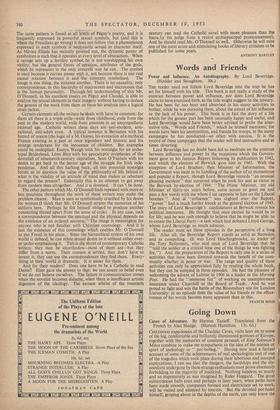Words and Friends
Power and Influence. An Autobiography. By Lord Beveridge. (Hodder and Stoughton. 30s.) Power and Influence. An Autobiography. By Lord Beveridge. (Hodder and Stoughton. 30s.)
THE reader need not follow Lord Beveridge into the trap he has set for himself with his title. This book is not really a study of the contrast between power and influence, nor does Lord Beveridge claim to have exercised both, as the title might suggest to the unwary. He has been far too busy and absorbed in his many activities to bother, while he was pursuing them, about the extent of his influence or the lack of his power. This book is in fact the story of a life which for the greater part has been unusually happy and useful, and Lord Beveridge would have been better advised to prefer the alter- native title, "Words and Friends," which he himself mentions; for words have been his ammunition, and friends his troops, in the many campaigns he has conducted—so often with success. It is the record of these campaigns that the reader will find instructive and at times diverting.
Lord Beveridge has no doubt been led to meditate on the contrast between influence and power by the receptions which the Govern- ment gave to his famous Report following its publication in 1942, and which the electors of Berwick gave him in 1945. With the exception of Lord Bracken, then Minister of Information, the Government was inept in its handling of the author of so momentous and popular a Report, though Lord Beveridge records "an unusual pleasing incident" that occurred when he took his seat as victor in the Berwick by-election of 1944: "The Prime Minister, my old Minister of thirty-six years before, came across to greet me and pass a few words with me where 1 sat opposite to him on the Liberal benches." And if "influence" was slighted over the Report, "power" had a much harder knock at the general election of 1945. The story of Lord Beveridge's candidatures at Berwick reveals his political innocence. He thought that once elected he would be in for life; and he was rash enough to believe that he might be able to re-create the Liberal Party—a task which had defeated Lloyd George, whom Lord Beveridge so much admires.
The reader must set these episodes in the perspective of a long life. After all, the Beveridge Report stands as solid as Snowdon and as compelling. (It was Lord Hinchingbrooke, as leader of the Tory Reformers, who said once of Lord Beveridge that he "told the soldier at a critical time one of the things he was fighting for.") And the preparation of the Report is only one in a series of activities that have been directed towards the benefit of the com- munity whether in peace or war. The range and quality of these activities can only be appreciated fully by reading the whole book, but they can be sampled in three episodes. He had the pleasure of welcoming the advent of Labour in 1906 in a leader in the Morning Post. He had the "immense fun" of working on unemployment insurance under Churchill at the Board of Trade. And he was proud to fight and win the battle of the Bloomsbury site for London University: in no episode does the value of his friends or the effect- iveness of his words become more apparent than in this.
FRANCIS BOYD










































 Previous page
Previous page